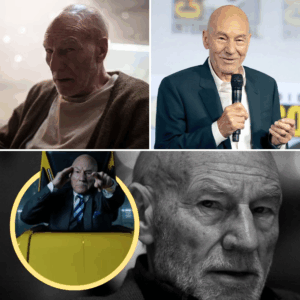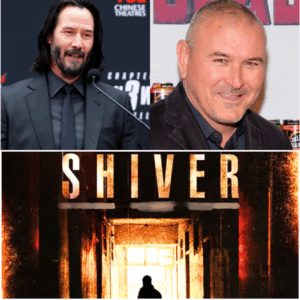My name is Ellie Thompson, and for the past three years, I’ve been a waitress at Golden Hearth, a little diner tucked away in the rolling hills of Kentucky. It’s the kind of place that looks like it stepped out of a postcard—faded red brick walls, checkered tablecloths, and a neon sign that flickers “Open” like a heartbeat in the night. But postcards don’t tell the whole story. They don’t show the grease burns on my arms or the ache in my feet after a double shift. They don’t capture the way the air inside feels heavier these days, thick with unspoken frustrations and the faint scent of overcooked coffee. I never imagined my life would revolve around wiping down counters and dodging rude customers, but here I am, 28 years old, holding on to this job like it’s the last thread in a unraveling sweater.
Golden Hearth wasn’t always like this. When I started, the old timers would tell stories about its founder, a woman named Patricia Reeves. She opened the place over 30 years ago, back when it was just a roadside stop for truckers and locals craving a home-cooked meal. Patricia was a force—a single mother who’d poured her heart into every recipe, every smile. She named it Golden Hearth after the “golden flame” of kindness she believed everyone carried inside. “Treat every guest like family,” she’d say, or so the legend goes. Her son had grown up here, helping in the kitchen before he left for bigger things. No one talked much about him anymore, though. Rumors whispered he was some Hollywood star, but that seemed like fairy tale nonsense in a town where dreams rarely stretched beyond the county line.
I came to Golden Hearth desperate for work. My life hadn’t been easy—grew up in a trailer park on the edge of town, dad left when I was five, mom worked two jobs until her back gave out. I dropped out of community college to care for her, and when she passed last year from cancer, I was left with bills and a hollow chest. The diner hired me on the spot, no experience needed. At first, it felt like a blessing. The regulars were kind, tipping extra when they saw my weary eyes. The kitchen buzzed with laughter, and the manager back then, old Mr. Harlan, treated us like his own kids. But Harlan retired six months ago, and that’s when Carl took over.
Carl was a storm cloud in human form—tall, broad-shouldered, with a perpetual scowl that made his mustache twitch like it was alive. He came from corporate, some chain restaurant up north, and he ran Golden Hearth like a factory. “Efficiency over emotion,” he’d bark during staff meetings, slashing breaks and docking pay for the smallest mistakes. The warmth Patricia had built? It evaporated under his watch. Waitresses like me and my coworker Jenna started dreading shifts. We’d whisper in the back room about quitting, but jobs were scarce in this economy. I needed the money for my little apartment and the medical debts still hanging over me like a noose.
That rainy Tuesday in November was no different. The sky hung low and gray, spitting fat drops against the diner’s windows like accusations. It was a slow afternoon—only a handful of customers nursing coffee and pie. Jenna was on break, smoking out back, and Carl was in his office, probably tallying ways to cut costs. I wiped down the counter for the tenth time, my apron stained with syrup from the breakfast rush. My feet throbbed in my worn sneakers, and I caught my reflection in the chrome toaster: dark circles under my eyes, hair frizzing from the humidity. At 28, I felt 40.
The bell over the door jingled, letting in a gust of damp wind. I looked up, plastering on my customer smile. The man who entered was unassuming—a weathered coat dripping rain, a woolen hat pulled low over his brow, stubble shadowing his jaw. He moved slowly, like the weather had seeped into his bones, and took a seat at the far end of the counter. “What can I get you?” I asked, my voice brighter than I felt.
He glanced up, his eyes kind but tired—deep brown, with lines that spoke of laughter and loss. “Pancakes, please. And black coffee. Hot as you can make it.”
His accent was faint, something foreign but familiar, like an old movie star. I nodded, pouring the coffee first. As I set it down, our hands brushed briefly. His were warm, callused. “Rough day out there,” I said, trying to make small talk. He smiled faintly, nodding. “Rough day everywhere, I suppose.”
I turned to the kitchen, relaying the order to Manny, our cook. As the pancakes sizzled on the griddle, I felt the man’s gaze on me—not creepy, but observant. Like he was seeing more than just a waitress. Carl emerged from his office then, his face twisted in that perpetual frown. He spotted the new customer and grunted, then turned to me. “Ellie, that table three’s check is wrong. Fix it, or it’s coming out of your tips.”
I bit my tongue. Table three had been fine—I’d double-checked. But arguing with Carl was like wrestling a bear; you’d lose every time. “Yes, sir,” I muttered, hurrying over. As I passed, I heard Carl snap at Jenna, who’d just come in from her break. “Late again? That’s a write-up.” Jenna’s eyes welled up; she was a single mom with two kids, and couldn’t afford another mark on her record.
The pancakes were ready. I plated them with a drizzle of maple syrup and fresh berries—Golden Hearth’s signature touch, even if Carl had cheapened the ingredients. Setting it before the man, I said, “Enjoy. Let me know if you need anything else.”
He nodded thanks, but his eyes lingered on the scene behind me—Carl berating Jenna in hushed tones, her shoulders slumping. “Everything alright here?” he asked quietly, fork paused mid-air.
I forced a smile. “Oh, just the usual. Boss is… particular.”
He ate slowly, savoring each bite like it was a memory. The diner was quiet, save for the rain pattering and the hum of the old jukebox in the corner, playing some faded country tune. I busied myself refilling salt shakers, but I felt his presence—a quiet anchor in the storm of my day. When he finished, he left a generous tip—$50 on a $12 bill. As he stood to leave, pulling his coat tight, he turned to me. “Thank you for stopping by,” I said automatically, the words tasting like habit.
He paused, tilting his head. “You say that like it’s a plea.”
I blinked, caught off guard. No customer had ever noticed the weariness in my voice. “Just being polite,” I replied, but my smile faltered.
He nodded, then glanced at Carl, who was now yelling at Manny over a burned batch of fries. The man’s face hardened. “Places like this… they’re supposed to be homes away from home. Not prisons.”
Before I could respond, he was gone, the bell jingling his exit. I pocketed the tip, my heart a little lighter. Fifty dollars meant groceries for the week. But something about him lingered—like a half-remembered dream.
The next day was worse. Carl was in a foul mood, slashing hours because “business is slow.” Jenna quit on the spot after he accused her of stealing from the till—a lie, but she couldn’t take the humiliation. I was left to handle the lunch rush alone, juggling plates and complaints. My back ached, my spirit more so. As I mopped up a spilled milkshake, I wondered how much longer I could endure. Patricia’s “golden flame” felt like a dying ember.
The bell jingled again around 2 p.m. I looked up—and there he was. The same man, same coat, same quiet demeanor. “Pancakes again?” I asked, smiling genuinely this time.
He shook his head. “Actually, I’d like to talk to the manager.”
My stomach dropped. Had I done something wrong? Carl lumbered out, arms crossed. “What can I do for you?”
The man removed his hat, revealing a bald head and those familiar eyes. But now, without the shadow, I recognized him. My jaw dropped. Keanu Reeves. The Hollywood star. Son of Patricia Reeves, the founder of Golden Hearth.
Carl’s face paled. “Mr. Reeves? I… I didn’t recognize you.”
Keanu—because that’s who he was—nodded calmly. “That’s the point. I’ve been away for over 30 years. Wanted to see if my mother’s spirit still lived here.”
The diner fell silent. Customers stared, phones out. Keanu turned to me. “Ellie, is it? You remind me of her—my mother. Kind, even when the world’s not.”
Tears pricked my eyes. “She built this place?”
He nodded. “With her own hands. After my father left, she started with nothing but recipes and resolve. Taught me that kindness isn’t weakness—it’s the real strength. But what I saw yesterday… coldness, fear. That’s not her legacy.”
Carl stammered excuses—slow business, tough times. Keanu cut him off. “Excuses don’t feed families or warm hearts. You’re fired.”
The room gasped. Carl slunk away, defeated. Keanu addressed the staff—Manny, the dishwasher Luis, and me. “This place is mine now. My mother’s gift to me. And I’m giving it back to you—the people who make it live.”
In the days that followed, everything changed. Keanu stayed a week, rolling up his sleeves. He repainted the walls a warm gold, updated the menu with Patricia’s original recipes—fluffy pancakes, hearty stews. He hired back Jenna with a raise, brought in counselors for stress, even installed a play area for staff kids. “Work shouldn’t break you,” he said. “It should build you.”
For me, it was transformative. Keanu sat with me one evening, over coffee. “I saw your exhaustion, Ellie. Reminded me of Mom. She worked three jobs to raise me. Kindness saved us—strangers who became family.”
I opened up about my mom, the debts, the loneliness. He listened, then offered a scholarship for me to finish college. “Pass the flame,” he said.
When he left, Golden Hearth was reborn. Laughter filled the air, customers returned for the warmth. I became manager, leading with Patricia’s ethos. Keanu’s visit wasn’t just a celebrity story—it was a reminder: in a cold world, one act of kindness can reignite the golden flame.


